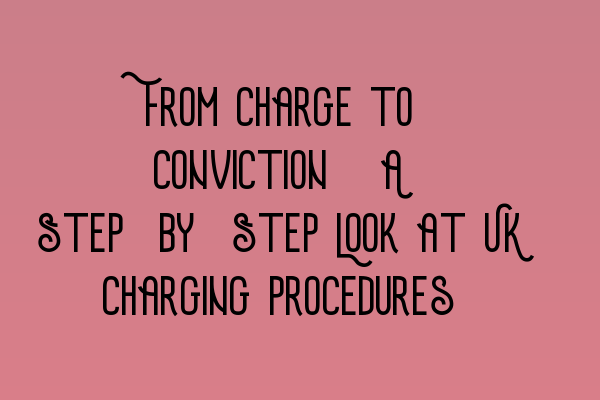From Charge to Conviction: A Step-by-Step Look at UK Charging Procedures
Introduction
The criminal justice system in the United Kingdom ensures that individuals are treated fairly and justly throughout the course of criminal proceedings. One crucial stage in this process is the charging procedure, which marks the transition from suspicion to formal accusation. In this blog post, we will take a comprehensive look at the step-by-step process of charging individuals with criminal offenses in the UK.
1. Initial Investigation
The journey from charge to conviction begins with an initial investigation conducted by the police. The police gather evidence, interview witnesses, and assess the circumstances of the alleged crime. This investigation sets the foundation for subsequent charging decisions.
2. Arrest or Summons
Once the police have gathered sufficient evidence, they may opt to arrest the suspect or issue a summons. An arrest involves detaining the suspect, whereas a summons requires the individual to appear in court voluntarily at a specified date and time.
3. Police Bail or Custody
After arrest, the suspect may be released on police bail or held in custody. Police bail allows the suspect to remain in the community under certain conditions until the trial, while custody involves detention in a police station or prison.
4. Decision to Charge
The decision to charge is made by the Crown Prosecution Service (CPS) in England and Wales, or the Procurator Fiscal Service (PFS) in Scotland. The CPS and PFS review the evidence gathered during the investigation and consider factors such as public interest and likelihood of conviction when deciding whether to proceed with formal charges.
5. Charge Approval
If the CPS or PFS decides to proceed with charges, the case is referred to a senior prosecutor for charge approval. The senior prosecutor reviews the evidence, assesses the strength of the case, and ensures that there is a realistic prospect of conviction.
6. Charging Document
Once the charge has been approved, a charging document outlining the offense(s) and supporting details is prepared. This document is then presented to the court, and a copy is served on the accused or their legal representative.
7. First Court Appearance
The accused is required to appear in court for the first hearing, known as the “initial hearing” or “first appearance.” During this hearing, the charge(s) are read out, and the accused is asked to enter a plea of guilty or not guilty. Additionally, bail conditions may be reviewed or varied during this hearing.
8. Plea and Case Management Hearing
If the accused pleads guilty, the case proceeds to a plea and case management hearing (PCMH). During this hearing, the court considers the facts of the case and any mitigating circumstances. If the accused pleads not guilty, the case is listed for trial.
9. Committal Proceedings (England and Wales Only)
In England and Wales, certain serious cases are subject to committal proceedings. These proceedings take place in the Magistrates’ Court and determine whether the case should be tried in the Crown Court, which hears more serious offenses.
10. Pre-trial Preparation
In the period leading up to the trial, both the prosecution and defense engage in pre-trial preparation. This includes gathering evidence, interviewing witnesses, and disclosing relevant information to the opposing party.
11. Trial
The trial is the main event where the prosecution presents its case and the defense has an opportunity to challenge the evidence brought against the accused. The trial is presided over by a judge, and the decision is ultimately made by a jury, except in certain cases where the judge considers it appropriate to make a verdict themselves.
12. Verdict and Sentencing
Once the trial concludes, the jury deliberates and delivers a verdict: guilty or not guilty. If the accused is found guilty, the court proceeds to sentencing, taking into account aggravating and mitigating factors. Sentencing can involve a range of outcomes, including fines, community orders, imprisonment, or a combination thereof.
Conclusion
The journey from charge to conviction in the UK involves a series of well-defined steps designed to safeguard the rights of both the accused and society as a whole. By understanding these charging procedures, individuals can better comprehend the legal process and ensure that justice is served. If you or someone you know is facing criminal charges, it is essential to seek professional legal advice to navigate through these complexities successfully.
